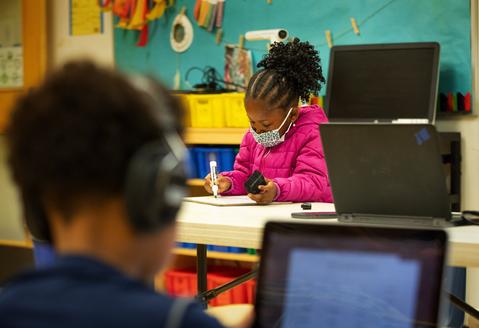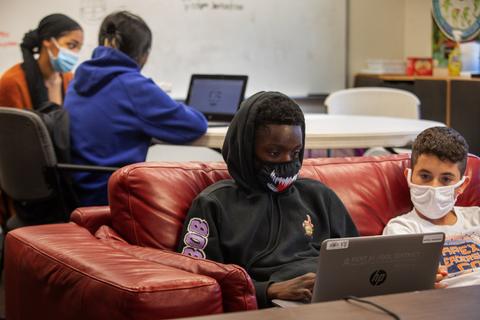Staff at the Birch Creek youth center knew that summer programming during a pandemic would be different, but they didn’t know how different. On the first day of program, out of the 30 youth signed up, only one attended.
As they tried to address the barriers, they kept finding new ones. Kids felt awkward on video calls with their peers. Some families didn’t have the tech they needed, or didn’t know how to navigate the online platforms. It was straightforward when kids could drop in to programming at the youth center in their neighborhood, but now their homes have had to become effective spaces to learn. Partnering through the King County Best Starts for Kids initiative, Kent Youth and Family Services (KYFS), the YMCA of Greater Seattle, Coalition for Refugeed from Burma (CRB), and Somali Youth and Family Club (SYFC) looked for the learning opportunities presented, and have come to see their summer programming as a trial run that prepared their kids for an unconventional school year.
KYFS and YMCA typically lead summer programming at Birch Creek, but this year SYFC did family support for middle and high schoolers and CRB did 1-on-1 reading programming in students’ homes. KYFS did outreach helping kids get set up with the tech platforms being used in the Kent School District. “This has made us more involved with the families” says Cyoon McBride, Afterschool Program Manager. Jeff Girmus, Afterschool Site Supervisor, agrees. “You have to go out to the community and build those relationships. Check in with students, go to their houses physically. We’re used to them coming to us, but we have to go to them.” In addition to supporting tech access, they also provided incentives to youth. Kids could earn money each week for attending all four days of programming, which Cyoon designed with the understanding that the money would likely be supporting families’ basic needs during the pandemic.

(Photo by Ellen M. Banner / The Seattle Times)
Programming also provided some relief for families feeling the strain of being cooped up together. While in program, kids could have some of their social emotional learning needs met with casual time they were craving with the other kids in the neighborhood, and have meaningful interactions with supportive adults. “They weren’t able to talk to their teachers, so they came to us and asked questions about Black Lives Matter. We’ve been able to really deepen our relationships with them.” Says Cyoon. “I’ve learned so much from them, and am so impressed with the knowledge and awareness that they have.” Jeff says “by creating better relationships with families, everyone is used to us walking down the street towards their house. The more open sessions, even just a normal check-in question have been so impactful. We definitely want to keep some element of virtual program moving forward, to stay connected with kids who aren’t able to attend in person.”
While simple ways of staying connected were an oasis during such an isolating, uncertain time, the programming was clearly engaging. “By the fourth week or so,” says Jeff, “we hit our groove and it was clear that we needed to be really interactive. We did a lot of sharing screen, a lot of reading together.” The YMCA’s Summer LIT program (Leaders In Training), which served middle schoolers, offered four different themes for each week. Some lessons included classes on communication and conflict resolution, racial justice, “world council” where students created solutions to environmental problems and presented them, and life skills classes where they could learn things like car maintenance and emergency preparedness. All participants attended a leadership session, and then could choose two additional sessions. By the end of the summer, kids were choosing to attend all of the available sessions.
I’ve learned so much from them, and am so impressed with the knowledge and awareness that they have.
Cyoon McBride, Afterschool Program Manager
Moreover, rising 9th graders who had previously participated in Summer LIT volunteered to come back this summer and help run the program. “They volunteered their summer. They had experienced the impact of the program, they knew its value, and they wanted to come back,” says Jaawell Faggins of the YMCA. “As a program director, that really touched me on a personal level.” The volunteers were captains of their own teams of kids, their own caseload, and they led the groups through projects like debate. KYFS has been so impressed by the leadership of participants of Summer LIT that they hired some of them for paid internships in their own program. They were assigned to a teacher, and similarly had a caseload of kids they were responsible for. They supported virtual programming, helped design the curriculum and deliver supplies for any in-person activities, and escorted kids to the youth center and conducted their pre and post academic assessments. “Now I have a pool of people I can trust. KCHA is moving to a day program [to support on-site learning for students during the school day], and it’s great to have some of these leaders available to support.”

(Photo by Ellen M. Banner / The Seattle Times)
Birch Creek programming looks different from last school year. In-person activities are limited, with KYFS and the YMCA in separate spaces, and young people receive health screenings upon arrival. Despite all of the changes and challenges, the partners have identified some clear lessons from their summer strategies and are proud of how they are continuing to provide connection and support . “More isn’t always better!,” says Jeff. “We get caught up in the number of kids, number of programs, how long, and some of the best programs we had this summer were three kids for 30 minutes, Your impact, especially in a time like this, is magnified.” Jaawell cites youth voice as being crucial to keeping kids engaged during distance learning. “They say they don’t like STEM in school, but they were so into the science and engineering we did!” Cyoon is staying focused on being adaptable in the face of so much change. “Virtual programming really brings forth the creativity. This is all trial and error. Don’t get stressed, don’t say ‘I don’t want to change this, we just changed it last week.’ Ask the kids what they want and figure it out! It’s ok if you mess up, just try again.”
